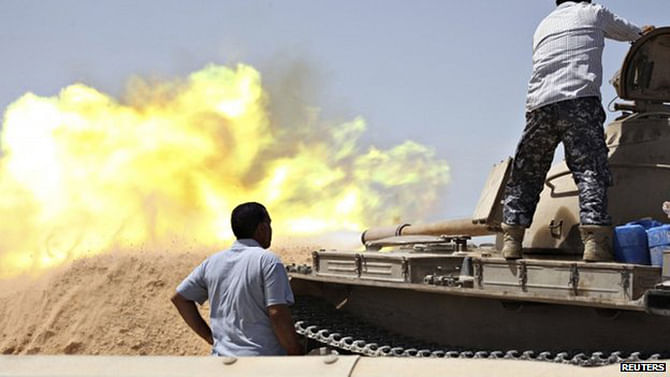Tension high as Libya airport seized
Tension high as Libya airport seized

Libya's newly-elected parliament has condemned as terrorists the militia alliance which says it has captured Tripoli's international airport.
It said the alliance was now a legitimate target for the armed forces.
The alliance includes Islamists and fighters from the city of Misrata.
A spokesman for the militia said that the new parliament was illegitimate and called for the country's former governing body, the Islamist-dominated General National Council, to reconvene.
The BBC's Rana Jawad in Tripoli says there are uncomfirmed reports of battles continuing between rival armed groups on the outskirts of the city, and explosions can be heard.
The country has been by gripped by conflict between rival militias that spearheaded the 2011 uprising against long-time leader Muammar Gaddafi. Several hundred people have died in a recent upsurge of fighting.
The militia alliance - which includes some Islamist fighters and others from the city of Misrata - said it had won control of the airport despite being targeted by mystery airstrikes for a second time this week.
The reported fall of the airport is a setback for the rival militia from the city of Zintan, allies of Gen Khalifa Haftar, who launched a campaign earlier this year against what he termed the "Islamist-dominated" government. They had controlled the airport for nearly three years.
Shortly afterwards the parliament, which is based in the eastern city of Tobruk because Tripoli and Benghazi are mostly outside government control, declared the victorious militias to be "terrorist organisations".
The statement did not include criticism of the Zintan militia, which now appears to have withdrawn from Tripoli.
Our correspondent says this omission suggests that the parliament has included them in some wider plan.
The violence - which correspondents say is the worst since the overthrow of Col Gaddafi - has been centred around the airport and in the eastern city of Benghazi.
Several hundred people are believed to have died in July and August in an upsurge of unrest.
Observers have often pointed out that Libya's complex web of militias often operate on a "my enemy's enemy is my friend" basis.
The country's militias and political parties alike have had shifting alliances over the last two years.
Our correspondent says that it is not a clear-cut Islamist versus nationalist battle because some militias are essentially fighting for their continued existence and empowerment.
Thousands have fled their homes to escape the violence.
More than three years after Gaddafi was overthrown and killed, Libya's police and army remain weak in comparison with the militias who control large parts of the country.